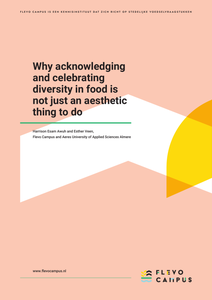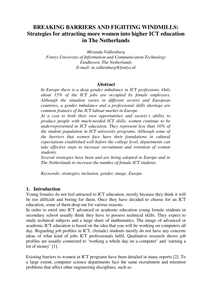From January 2011 until December 2012, forty Family Group Conferences (FGCs) will be studied in the public mental health care (PMHC) setting in the province of Groningen, the Netherlands. Research should yield an answer to whether FGCs are valuable for clients in PMHC as a means to generate social support, to prevent coercion and to elevate the work of professionals. The present study reports on two case studies in which shame and fear of rejection are designated as main causes for clients to avoid contact with their social network, resulting in isolated and marginalised living circumstances. Shame, on the other hand, is also a powerful engine in preventing clients from relapse into marginalised circumstances for which one needs to feel ashamed again. An FGC offers a forum where clients are able to discuss their shameful feelings with their social network; it generates support and helps breaking through vicious circles of marginalisation and social isolation. Findings of these case studies confirm an assumption from a previous study that a limited or broken social network is not a contraindication, but a reason for organising FGCs.
LINK
Een actieonderzoek naar de ontwikkeling van een leerlingversterkend onderwijsprogramma met het doel leerlingen met een visuele beperking beter voor te bereiden op hun transitie naar volwassenheid en waar mogelijk een betaalde baan. Belangrijke thema's: inclusie en exclusie, empowerment, stem van de leerling, transitie naar volwassenheid en het burgerschapsmodel tegenover het medische model.
DOCUMENT

Despite the notable strides that have been made in terms of participation in sport, women continue to be underrepresented in sport leadership roles such as coaching and officiating. The 2014 United Nations (UN) International Working Group on Women’s Sport (IWG) noted that: ‘Women are significantly under-represented in management, administration, coaching and officiating, particularly at the higher levels’ (IWG, 2014 p. 6). This statement, part of the Helsinki Declaration, was made in the context of how sport can support the UN Millennium Development Goals. Across today’s sporting landscape, women’s sport experiences typically occur in male-dominated contexts, which favour men and masculinity (Norman, 2016). Recent data indicates the men to women ratio in high-performance coaching over the last four consecutive Olympic cycles has been approximately 10:1. Among US high school sporting officials, only 11% are women, and even a greater disparity exists with officiating sports traditionally played by men (Nordstrom, Warner, & Barnes, 2016). This data highlights a systemic absence of women in coaching and officiating leadership roles across sport. In this chapter we will discuss the impact this has on developing sport for women and girls. Specifically, this chapter aims to: - Provide an understanding of the roles and responsibilities of coaches and officials in women and girls sport delivery. - Explore career development pathways for improving opportunities for women in coaching and officiating. - Present a critical reflection of the differences and similarities between athlete development and coach/official development (systems and structures) for women and girls. We begin by discussing the gendered nature of coaching before turning our attention to women’s experiences in sport officiating. We draw on relevant literature throughout the chapter and identify issues and opportunities for further research. We conclude by providing practical actions and recommendations to help facilitate coaching and officiating development for women and girls LinkedIn: https://www.linkedin.com/in/donna-de-haan/
MULTIFILE

This article is a reflection on the MACESS programme and its place in a changing education environment in Europe.
DOCUMENT

It is believed that recognising and celebrating diversity in our foodscapes is the right thing to do. But why, really? What benefits make it paramount for this diversity to be lauded? This question needs answering to add more legitimacy to promoting urban food diversity. In this essay we try to do so by investigating the link between ‘recognition justice’ – the celebration of diversity –and inclusion, and understanding inclusion as vital for (social) sustainability. We use two research projects to demonstrate empirically-based lessons which can be drawn to support the need to recognise and celebrate diversity in our urban foodscape.
DOCUMENT

In Europe there is a deep gender imbalance in ICT professions. Only about 15% of the ICT jobs are occupied by female employees. Although the situation varies in different sectors and European countries, a gender imbalance and a professional skills shortage are common features of the ICT labour market in Europe. At a cost to both their own opportunities and society's ability to produce people with much-needed ICT skills, women continue to be underrepresented in ICT education. They represent less than 10% of the student population in ICT university programs. Although some of the barriers that women face have their foundations in cultural expectations established well before the college level, departments can take effective steps to increase recruitment and retention of women students. Several strategies have been and are being adopted in Europe and in The Netherlands to increase the number of female ICT students.
DOCUMENT

In het winternummer van 2005, met het thema: Social Emergency and Crisis Intervention in Large European Cities, beschrijft Lia van Doorn de onderzoeksresultaten van een follow-up studie onder (voormalige) daklozen in Utrecht. Het betreft een kwalitatief onderzoek. In dit artikel worden drie fasen in het ontwikkelingsproces van de daklozen beschreven: Recente, langdurige en voormalige dakloosheid. De omstandigheden in deze fasen verschillen en daardoor ook de zorgbehoefte.
DOCUMENT

The crossroads of living in cities on the one hand and ageing of the population on the other is studied in an interdisciplinary field of research called urban ageing (van Hoof and Kazak 2018, van Hoof et al. 2018). People live longer and in better health than ever before in Europe. Despite all the positive aspects of population ageing, it poses many challenges. The interaction of population ageing and urbanisation raises issues in various domains of urban living (Phillipson and Buffel 2016). According to the Organisation for Economic Co-operation and Development (OECD 2015), the population share of those of 65 years old is expected to climb to 25.1% in 2050 in its member states. Cities in particular have large numbers of older inhabitants and are home to 43.2% of this older population. The need to develop supportive urban communities are major issues for public policy to understand the relationship between population ageing and urban change (Buffel and Phillipson 2016). Plouffe and Kalache (2010) see older citizens as a precious resource, but in order to tap the full potential these people represent for continued human development (Zaidi et al. 2013), the world’s cities must ensure their inclusion and full access to urban spaces, structures, and services. Therefore, cities are called upon to complement the efforts of national governments to address the consequences of the unprecedented demographic shift (OECD 2015). Additionally, at the city level there is a belief to understand the requirements and preferences of local communities (OECD 2015). An important question in relation to urban ageing is what exactly makes a city age-friendly (Alley et al. 2007, Lui et al. 2009, Plouffe and Kalache 2010, Steels 2015, Moulaert and Garon 2016, Age Platform Europe 2018)? Another relevant question is which factors allow some older people in cities to thrive, while others find it hard to cope with the struggles of daily life? This chapter explores and describes which elements and factors make cities age-friendly, for instance, on the neighbourhood level and in relation to technology for older people.
DOCUMENT

In the preparation of the celebration of the 10th anniversary of the MA CESS all alumni were invited to participate in an alumni survey. The purpose of the survey was to thoroughly investigate the professional activities of MA CESS alumni and the way they build an alumni community. Another reason for starting the project is that it may play a part in maintaining and enhancing a mutually beneficial relationship between MA CESS and its alumni. All over Europe there are graduates working in the social and social political field who experienced the same education and spirit in the MA CESS course. It’s an important thing to reach out to them, renew and encourage a spirit of enthusiasm and desire for continuing education, by creating instruments of communication and networking opportunities. The first part of the report deals with the construction of the alumni survey, namely the background, the assignment, the survey design, the sampling, the research limitations, the influences of gender and age on professional activities and the way of making contacts, facts and figures about the sectors of activity in which the alumni are engaged, what alumni have to say about the international dimension in their professional activities, their ideas about network building, and finally their critiques and suggestions for the MA CESS study programme. The second part contains a reflection about the alumni community, particularly the role of CESSNET (Network of the Comparative European Social Studies Alumni ) in the strategy to reach out to the alumni. The report ends with conclusions and recommendations.
DOCUMENT
